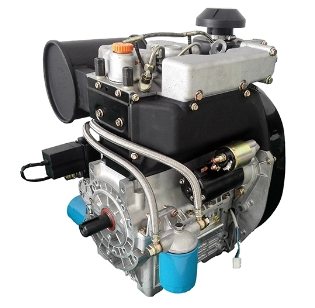I thought it was diesel The price is cheap, but when I actually went to the gas station, I found that the price of diesel is not much cheaper than gasoline. Large trucks often use diesel engines because diesel has some special charm. In fact, this charm is that the fuel efficiency of diesel engines is much higher than that of gasoline engines, generally more than 20%. Although the prices of diesel and gasoline are similar, diesel can do more than 20% more work.
The fundamental reason why large trucks use diesel engines is to reduce operating costs. Why exactly does this difference exist? What exactly is the difference between a gasoline engine and a diesel engine? Students who own cars are usually required to replace spark plugs during major maintenance. Spark plugs are the hallmark of gasoline engines, but there is no such thing for diesel engines.
The function of the spark plug is to ignite. Every time the piston in the cylinder works, the spark plug will start at a suitable moment after compressing the air and gasoline. The flame will spread from the spark plug to the cylinder, and finally the gasoline in the cylinder will mix. The gas is burned and the piston is pushed to work. This is how a gasoline car obtains power.
How can a diesel engine ignite without a spark plug? It's very simple. It compresses diesel and gas to make the diesel reach the auto-ignition point, and it will burn on its own. Therefore, the compression ratio of diesel engines is generally higher than that of gasoline, and its combustion efficiency is also higher. Not only you, but also myself have some clues here. Gasoline is obviously easier to burn, so why does it have to be ignited with a spark plug instead of spontaneous combustion? Isn't this unnecessary? Actually that's not true.

There is a problem involved here - the spontaneous ignition point. Judging from the data, the self-ignition point and ignition point of diesel are actually lower than that of gasoline. Diesel is easier to self-ignite than gasoline, so diesel is more suitable for compression self-ignition ignition. But a new problem arises here. The ignition point and auto-ignition point of diesel are lower than that of gasoline. Why is diesel not easy to ignite in life, but gasoline is easy to ignite? Doesn’t this contradict the data? Actually no. This involves the issue of volatility. Gasoline is very volatile when it is not sealed and is not easy to vaporize. This results in a very low flash point of gasoline.
The word flash point may not be common. You can simply understand it as the lowest ignition temperature of flammable liquids. The flash point of gasoline is only 28 degrees Celsius. A small flame can easily ignite gasoline. But if there is no external ignition source, gasoline must reach 510 degrees Celsius before it can spontaneously ignite. Compared with the 350 degrees Celsius temperature of diesel, diesel is relatively easy to ignite by compression and spontaneous combustion. It is more suitable for gasoline to choose an external fire source such as spark plugs for ignition. The energy density of diesel is also higher than that of gasoline. Coupled with a larger compression ratio, this makes the combustion efficiency of diesel engines higher.
But why does the diesel engine have a large torque and a small horsepower? The diesel engine has a high compression ratio, and its cylinder length is actually longer than that of a gasoline engine, which also allows its piston connecting rod to be made very large. long. The crankshaft can also be made longer. It's like if you use a one-meter-long wrench to tighten a screw and pedal a one-meter-long bicycle, the crankshaft torque must be very large. Although the torque is greater, the workmanship range of the crankshaft and connecting rod is larger, and its frequency is not as high as that of the diesel engine. Therefore, the power or horsepower of the diesel engine is relatively small. It's powerful and does heavy work, but it's not very efficient.
A diesel engine is like an elephant pulling goods. Although it pulls more goods each time, its speed is slow. A gasoline engine is like a horse-drawn cart. Although it doesn't pull much each time, it's very fast. As for why the diesel engine is noisier, it can be better explained. Its piston stroke is longer, and the vibration is naturally more severe than that of a gasoline engine. However, with the current level of engine manufacturing, it is difficult to distinguish high-end models in the car.


Add: Zhaiqiao Industrial Cluster,Qianhuang Town,Wujin District,Changzhou City,Jiangsu Province,China
Tel/Fax: +86-0519-85188296
Phone: +86-138015037448 / +86-13961492147
Postcode: 213172
Email: info@kyhon.com